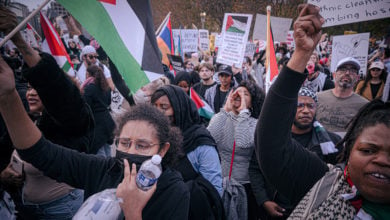Over 500 workers rallied
outside the Egyptian parliament on May 2 to demand an increase in the 35 pound
($6.30) a month minimum wage, which has been stagnant since 1984. Union
members, state workers and pro-democracy groups all took part in the militant
rally. Protesters called for an end to President Hosni Mubarak’s rule and
chanted, “We need wages that are enough for a month!”
|
Wage protest, Cairo, Egypt, April 3 |
The struggle began in February,
when 400 workers staged a sit-in in front of the Council of Ministers in Cairo.
That month, thousands of workers took to the streets throughout the country.
The government was unable to silence the demonstrators, who were protesting low
wages, poor working conditions in the factories, and high prices for subsidized
commodities such as bread and corn oil. At the May 2 demonstration, the workers
expressed their dissatisfaction with the Egyptian Trade Union Federation, which
has close ties to the National Democratic Party, the ruling party of Egypt. The
workers are frustrated because the union does little to promote workers’ rights
or improve living conditions.
Labor protests have been
increasing over the past six years. Since 2004, 2 million Egyptians have
participated in strikes, demonstrations and sit-ins. (AOL news) The success of
the movement rests largely on the ability for a national, united leadership to
emerge. About 2.3 million Egyptians are unemployed, bringing the unemployment
rate to 9.7 percent. About 20 to 30 percent of the population lives below the
poverty line. The high rates of unemployment and poverty are a result of
neoliberal policies imposed by the United States and multi-national
corporations. The cotton workers of the Nile Delta area have been hit the
hardest, because foreign companies have been taking over cotton factories and
laying off workers.
Mubarak has been president of
Egypt since 1981. He has been ruling with powers under an emergency law, which
allows the government to imprison activists, ban opposition parties such as the
Muslim Brotherhood, and use military courts against opposition activists. Egypt
receives the second largest amount U.S. military aid, after Israel. In Egypt,
this aid is used by the military against the progressive sectors of Egyptian
society and to protect Israel’s security as a proxy state for U.S. imperialism.







